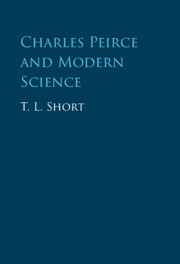Book contents
- Charles Peirce and Modern Science
- Charles Peirce and Modern Science
- Copyright page
- Dedication
- Contents
- Preface
- Acknowledgments
- A Note on Citation of Sources
- Chapter 1 Peirce’s Life in Science: 1859–1891
- Chapter 2 Peirce’s Concept of Science
- Chapter 3 Modern Science Contra Classical Philosophy
- Chapter 4 The Meaning of Pragmatism
- Chapter 5 Misleading Appearances of System
- Chapter 6 Devolution of the Cosmogonic Program
- Chapter 7 Experiments Expanding Empiricism
- Chapter 8 Phaneroscopy and Realism
- Chapter 9 Normative Science
- Chapter 10 Modern Science Contra Modernity
- Bibliography
- Index
Chapter 10 - Modern Science Contra Modernity
Published online by Cambridge University Press: 26 October 2022
- Charles Peirce and Modern Science
- Charles Peirce and Modern Science
- Copyright page
- Dedication
- Contents
- Preface
- Acknowledgments
- A Note on Citation of Sources
- Chapter 1 Peirce’s Life in Science: 1859–1891
- Chapter 2 Peirce’s Concept of Science
- Chapter 3 Modern Science Contra Classical Philosophy
- Chapter 4 The Meaning of Pragmatism
- Chapter 5 Misleading Appearances of System
- Chapter 6 Devolution of the Cosmogonic Program
- Chapter 7 Experiments Expanding Empiricism
- Chapter 8 Phaneroscopy and Realism
- Chapter 9 Normative Science
- Chapter 10 Modern Science Contra Modernity
- Bibliography
- Index
Summary
Modern science is conventionally blamed for the ills of modernity: our hedonism, selfish individualism, and aimless turmoil. Peirce, to the contrary, consistently opposed modern science to modernity, ironically associating it with medieval scholasticism – in anti-individualist method, in realist metaphysics, and in morals. By extending scholastic realism to triadic relations, he could maintain that societies are irreducible to their existing members and, indeed, that persons are social products. In particular, the scientist’s freedom of thought derives from education by and membership in the research community. Restlessness is the one feature of modernity that Peirce embraced: the research community is united in an endless pursuit of truth, hence in a faith that the truth can be known. Science, thus, is a model of selfless devotion to a transcendent, dimly perceived cause. Possibly, this vision was Peirce’s moral motivation; but the several inquiries he initiated, each highly original, resist even such a reduction.
- Type
- Chapter
- Information
- Charles Peirce and Modern Science , pp. 252 - 259Publisher: Cambridge University PressPrint publication year: 2022

